NovoBiome and INRAE: a new Associated Partner Laboratory on human gut microbiota
Published on 24 June 2021

NovoBiome ("the Company"), a drug discovery company developing breakthrough Live Biotherapeutics Products (LBPs)[1] targeting the microbiome-gut-liver axis, is building NovoSift®, a disruptive ex-vivo research and discovery platform to analyze the symbiotic relationship between the microbiota and the human intestine.
INRAE, and in particular the MetaGenoPolis unit (MGP), has a world-renowned expertise and an in-depth knowledge of the metagenomics of the intestinal microbiota. MGP has developed a unique know-how on high-throughput functional metagenomics. NovoBiome and INRAE have entered into a partnership to develop a new functional metagenomic approach using innovative reporter systems based on human intestinal organoids, and allowing to measure the impact of interactions between the microbiota and the host on intestinal permeability in the presence or absence of substrates of interest (molecules, probiotics, prebiotics or foods) and using confocal microscopy and artificial intelligence.
For INRAE, this is the second agreement of this new kind of agile partnership aimed at accelerating the development of innovations. Co-constructed by NovoBiome and MGP, the NovoSift® platform project will enable the pooling of human and material resources over a period of 5 years in order to upgrade the paradigms of ex vivo studies.
The NovoSift® platform aims at becoming a true Rosetta stone of host-microbiota interactions.
Pierre-Yves Mousset, Chief Executive Officer of NovoBiome, said: "Next-generation sequencing and quantitative metagenomics approaches have allowed the reconstruction of whole genomic entities. Then, functional metagenomics has allowed access to the potential of bacterial genes of the whole gut microbiota. Now we need to understand how these functions are regulated in the host-microbiota relationship. To make a linguistic analogy, after words and syntax, the NovoSift® platform aims at deciphering the semantics and becoming a true Rosetta stone of these critical interactions. The MGP unit has not only been a pioneer but also remains at the forefront of world research in this field. It is therefore a privilege for NovoBiome to be able to count on this excellent partnership."
A new type of partnership that is flexible and mutually beneficial for both entities.
“INRAE is proud to see the emergence of start-ups such as NovoBiome, which enhance the excellent academic work initiated by INRAE researchers. Our strong commitment to support these initiatives has prevailed in the design of a new type of partnership that is flexible and mutually beneficial for both entities. The shared objective is performance but also efficiency in speeding up the implementation of new concepts.” commented Philippe Lénée, Director of Partnership and Transfer for Innovation at INRAE.
[1] LBPs are medicinal products containing living micro-organisms such as bacteria or yeasts, which have a positive influence on the health and physiology of the host. Source: Ph. Eur. Monograph 3053 (EDQM, 2019)

MetaGenoPolis (MGP) is an INRAE laboratory expert in gut microbiome research applied to human and animal health and nutrition, funded by the Programme des Investissements d'Avenir (Laureate 2012 and 2019). MGP's expertise in the analysis of the gut microbiome and its implications for health and nutrition has been widely recognized in the international scientific community since 2010.In collaboration with industry, academia and clinics, MGP conceives and implements projects tailored to the partner’s need. ISO 9001 certified, the protocols and procedures are constantly maintained at the cutting edge of technology. To explore the link between the microbiome, nutrition and health, MGP has innovative technological platforms accompanied by an ethical center UCLy (Catholic University of Lyon).MGP offers end-to-end microbiome analysis services, including DNA extraction, library preparation, shotgun sequencing, quantitative and functional metagenomics, big data storage and computing facilities, bioinformatics, statistical analysis, and data interpretation. MGP also aims to develop more industrial partnerships and the creation of start-ups to accelerate microbiome science and innovation in health and nutrition.
NovoBiome is a biotech company developing Live Biotherapeutics Products, a novel and emerging class of drugs, defined by the EMA as medicinal products containing living micro-organisms such as bacteria or yeasts, which have a positive influence on the health and physiology of the host. NovoBiome is developing a proprietary platform, NovoSift®, that rationally identifies Live Biotherapeutics based on a deep understanding of functions and mechanisms.
Joint laboratories at the heart of INRAE's innovation policy
This new form of partnership has several advantages for INRAE and its partner. For INRAE, it will allow the emergence of new research topics and possible access to certain equipment, skills or data from its socio-economic partners. For the partner, it represents access to scientific excellence, to state-of-the-art equipment and to differentiation and competitiveness through innovation. For both partners, the results of the work could lead to publications, separately or jointly depending on the subject, but also to joint development, in particular by filing a patent.
